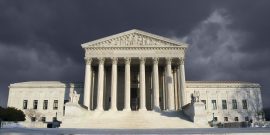The Usefulness of Constitutional Law
As usual, I find myself charmed by Mike Paulsen’s provocative style, which is on full display in The Uselessness of Constitutional Law. And, as usual, I agree with much of what he says. He is certainly right, for example, that constitutional law should not be taught in the manner of a bar preparation course. I also agree that constitutional law should not be part of the first year curriculum, where it is liable to be a misleading distraction at best.
Paulsen’s most significant claim is that constitutional law instructors, on the courts and in the academy, are mostly corrupters of easily corrupted young people. This may be empirically true, and I certainly have no reason to dispute it. His principal recommendation is that constitutional law be taught in law schools as an optional Great Books/Great Cases exercise.
Unfortunately, the claim and the recommendation do not fit very well together. If you take the claim seriously, then the recommendation looks at once too bold and too timid.
Paulsen’s central objection is aimed at the disgracefully result-oriented approach to law that characterizes much of the Supreme Court’s jurisprudence, as well as much of what one hears from professors of constitutional law. Learning from such teachers, students will simply have some of their most self-indulgent habits reinforced.
Paulsen is right that the danger he identifies is especially acute in this subject area, but it is hardly absent from others. The acuteness of the problem in constitutional law, moreover, provides an opportunity for responsible instructors to offer their students an especially valuable educational experience.
Much as Paulsen (and I) may dislike result-oriented reasoning in judicial opinions, and in what purports to be academic scholarship, such reasoning is among the most important skills that competent practicing lawyers must acquire. For most lawyers, the desired result is dictated by their client’s interests, and the lawyer’s job is to advance those interests within the bounds of applicable ethical principles. Unless our students learn to make the kind of arguments a court can accept, whether or not they find the conclusions congenial, they are being cheated in their education.
Constitutional law is indeed a field in which students tend to have an especially intense attachment to their own preferences. Precisely for that reason, this is an area in which they can most benefit from being challenged to defend positions with which they disagree, and from having to meet challenges to positions with which they agree.
There are two keys to doing this well.
First, use the Socratic method. Not with an eye to mocking or deploring the intellectual habits the students share with many Supreme Court Justices. The goal, rather, should be to help them cultivate skills they will need as practicing lawyers, who cannot get away with advocacy made up of ipse dixits and the occasional cri de coeur. It helps for the instructor to cultivate an appropriately modest view of his own knowledge and virtues, and to recognize that he can’t slam truth or virtuous habits into his students even if he happens to know what they are.
Second, use the best casebook you can find whose editors take an approach to the law with which you disagree. Our first goal as instructors should be to help the students recognize the best legal arguments on each side of the issues we discuss, and to understand through their own reasoning which arguments are stronger. When the instructor and the case book editors disagree, it curbs the students’ natural inclination to defer to the views of the individual who will be grading their exams. (This means, of course, that Paulsen should probably not use Paulsen’s casebook, though maybe Akhil Amar should do so.)
If our first goal is to provide our students with specifically legal training, as I believe it should be, Paulsen’s Great Cases approach is a mistake. In practice, constitutional law consists largely of precedents, and a practicing lawyer will almost always be forced to make his arguments largely from those precedents. This is especially true when practicing in the lower courts, where judges are much less free than Supreme Court Justices to indulge their own preferences and prejudices.
Unless students get a fair amount of experience with the way in which precedents have developed in the courts, they will not see constitutional law as a practicing lawyer needs to see it. (I do agree, however, that students should not be required to make a detailed study of the most lawless areas of constitutional law, such as equal protection and substantive due process. This is unnecessary at best, and eliminating the requirement frees up time for studying the evolution of precedent in other areas.)
Paulsen notes that few students will practice much constitutional law, but that is true of a lot of material in other required courses as well. How many students will ever use whatever they remember about future interests or the insanity defense? The skills and temperament developed in any properly conducted law class carry over into other substantive areas, and that is the chief reason for conducting introductory classes properly.
More significantly, perhaps, Paulsen thinks that turning the study of constitutional law into a civics lesson cum liberal education serves a nobler purpose than legal training. There is something to this point, which is why Blackstone thought that academic training should replace the older apprenticeship model.
But this is where Paulsen wimps out. First, if a civics course is really important, why downgrade the study of constitutional law to an elective? It might make life easier for the instructor, but it is inconsistent with the claim that the subject is genuinely important for every lawyer. In addition, Paulsen does not propose a civics course that fully takes account of the deeply corrupt culture that he believes the Court and the professoriate have produced.
There are two main ways in which one might design a serious civics course for lawyers.
If you start with the premise that the Constitution and constitutional law are inherently worthy objects of study, as Paulsen does, then you might begin by devoting considerable time to studying the Constitution itself and its genesis. That would require a lot more than a smattering of Federalist Papers and a recent book by your favorite academic commentator.
At George Mason, we tried requiring our students to take a one-semester prerequisite to constitutional law. The syllabus started with Magna Carta and other basic documents of the English constitution. It included numerous primary sources from the founding era, including all of the Federalist Papers and a large number of Anti-Federalist writings, as well as several early post-ratification constitutional debates outside the courts.
Things did not work out as we had hoped. Students and instructors alike were dissatisfied with the limited direct relevance of the readings to the subsequent course in constitutional law. A revised syllabus reduced the number of original documents from the Founding era, and added a considerable amount of material (including some judicial opinions) dealing with large issues that occupied political and legal debate in successive political eras.
This sounds like the kind of thing Paulsen has in mind when he says that a constitutional law course should be “a general liberal education course — part history, part civics, part political science and government, and part law.” George Mason’s class, I should emphasize, was a prerequisite to a more traditional course on constitutional law, not a substitute for it.
Once again, the results were disappointing. Many students continued to be quite unhappy with what they saw as a burdensome distraction from learning what they needed to begin their legal careers, and we did not observe significant useful effects in the subsequent case-oriented class on constitutional law.
In the end, we converted the class to an advanced elective, available to students after they have taken the required course in constitutional law. I think that decision was correct, primarily because there are case books that provide enough historical and political science background to help students read the cases in their historical and political context.
An alternative model might be based on Paulsen’s claim that the Supreme Court and the entire legal culture fostered by the Court is and always has been hopelessly corrupt. (In the course of noting that students are inclined to think with their politics or their preferences, an inclination that I believe they share with almost everybody else, Paulsen says that “the Supreme Court tends to do the same thing – and has for two centuries.”)
If you accept that claim, it is not clear exactly what is gained from reading a handful of famous Supreme Court opinions. To the extent that they are what Paulsen calls “artifacts of history,” why make them “objects of study and debate” by looking carefully at their corrupt, result-oriented reasoning? Perhaps the students should be shown what healthier thinking looks like.
That might involve serious authors who offer an alternative to our degenerate constitutional tradition. If that tradition is ever to be corrected or replaced with something better, it will presumably require action by people whose vision extends well beyond the limited horizons of the Federalist Papers and a handful of Supreme Court opinions. And well beyond what Paulsen thinks of as “a general liberal education course.” One might start, for example, with Cicero, St. Thomas Aquinas, and Montesquieu. After that, perhaps Plato, St. Augustine, and Rousseau.
Once you start down this road, of course, everything else in the law school curriculum starts to look increasingly trivial. So you might decide to replace other required courses with more worthwhile electives. Why study contracts instead of the Merchant of Venice? Why property instead of Pride and Prejudice? Why criminal law instead of the Oresteia, or torts instead of the Nicomachean Ethics?
Before long, you could end up with an excellent curriculum, but it would not do much to train lawyers. It wouldn’t corrupt the young by reinforcing their natural vices, but neither would it help them to become competent professionals. If anything, a truly liberal education might dissuade the best students from becoming lawyers at all.
But even if they still wanted to be lawyers, who would hire them? It’s true that there is at least one law school, Paulsen’s alma mater, where students may not need to learn much law. I once encountered a newly minted graduate of the Yale Law School who was hired, on the basis of a strong faculty recommendation, for a prestigious appellate litigation position in the federal government. Although the man was not well prepared even for this relatively high-level theoretical work, he later joined a large firm and went on to become an extremely successful lawyer. His success must have resulted from his exceptional aptitude, his diligence, and the quality of the mentoring he received after graduating.
Few law schools can stock their classes with a significant proportion of such extraordinary individuals, for whom a legal education might safely be offered as one choice among others. For better or worse, the government-sponsored cartel in legal services is not powerful enough to make that option generally available.
Paulsen has usefully raised some fundamental questions about why and how constitutional law should be studied and taught. I know that he is among our nation’s best students of the subject, and I trust that he is also among its best classroom instructors. In The Uselessness of Constitutional Law, however, I suspect that he has either misdiagnosed the disease or misconceived what would be required to cure it.

